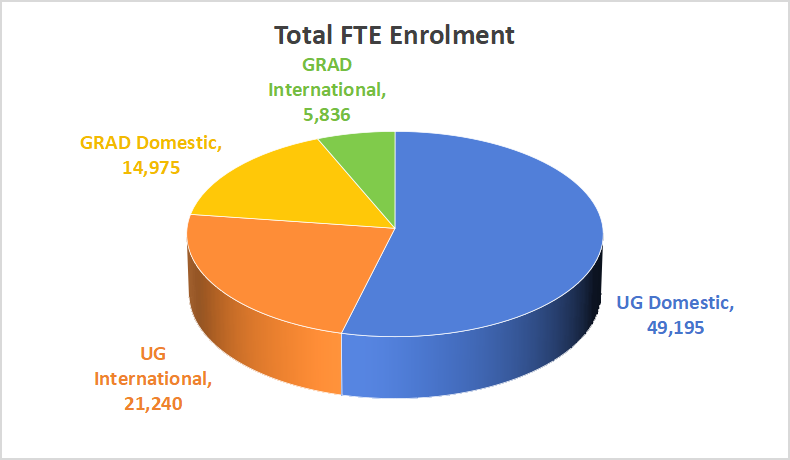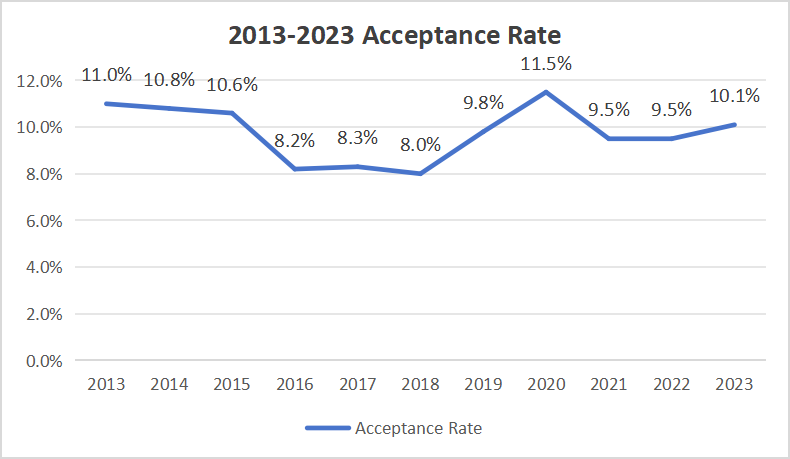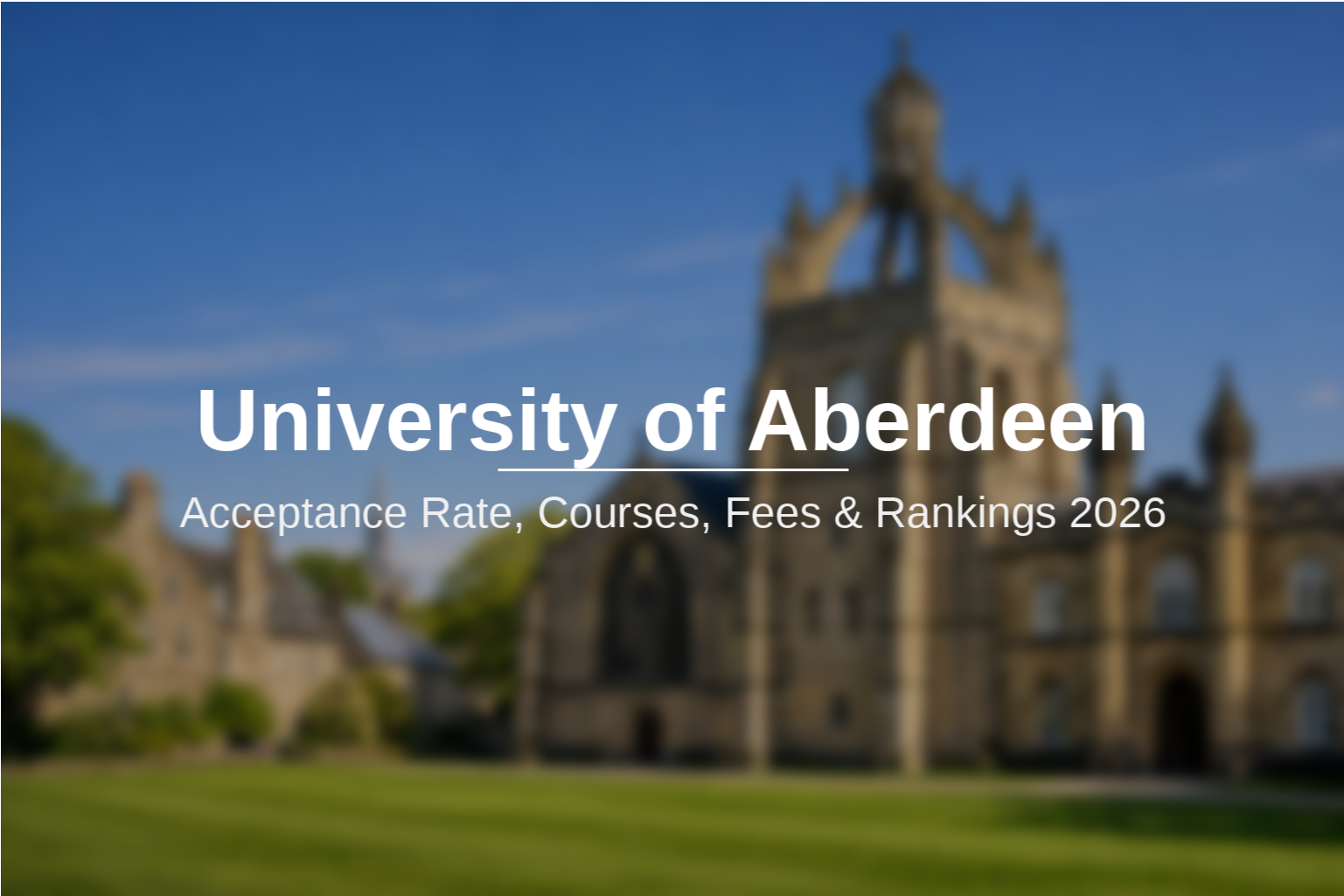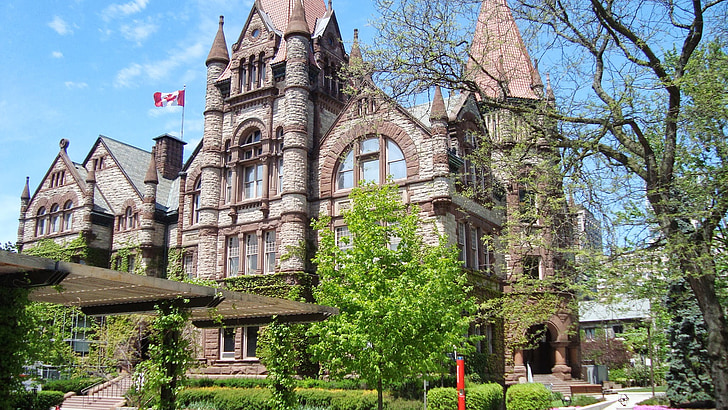The University of Toronto is about to start its new semester. As one of the most internationally renowned universities in Canada, U of T has always attracted much attention. And the University of Toronto acceptance rate is a topic of great concern to many people.
This blog will look in-depth at the University of Toronto acceptance rate, ranking, tuition, and more information. What are the chances of being admitted to the University of Toronto? What are the majors with the highest and lowest U of T acceptance rate? What is the trend of the University of Toronto’s acceptance rate? Which countries or regions do international students mainly come from? Etc.
About University of Toronto
Founded in 1827, the University of Toronto (U of T) is famous for its academic excellence, ingenuity and innovation. It has three distinct campuses: St. George Campus, Mississauga Campus(UTM) and Scarborough Campus(UTSC), offering more than 700 undergraduate programs and 200 graduate programs. When studying at the University of Toronto, students can not only get access to world-class faculty and resources, but they’ll also network with alumni and leaders from all walks of life around the globe, which can be very beneficial to their future personal development.
Toronto is a popular destination for international students to study abroad in Canada. In the 2024-25 school year, the University of Toronto had over 102,000 students, the largest number it has ever had. Almost 30% of these students are international, coming from 135 countries. The university ranks 29th in the world and number one in Canada for helping graduates get jobs (QS 2026). Getting into the university is very competitive. In 2024, it received 110,000 undergraduate applications. For popular programs like Computer Science, only 1 out of every 16 applicants gets accepted. Even though Canada has new rules for international students, the university plans to add about 1,700 more international undergraduate spots over the next five years. It keeps attracting students through strong academics and support with visas.
University of Toronto Ratings
The University of Toronto is a member of the U15 Group of Canadian Research Universities, the Association of American Universities, and the Association of Commonwealth Universities. The University is also ranked among the best universities in the world.
U of T World Ranking
- 2026 QS World University Rankings: 29th in the world
- 2025-2026 Best Global Universities Rankings: 16th in the world
- 2025-2026 Best Universities in Canada Rankings: 1st
- 2025 Times Higher Education Rankings: 21st in the world
U of T Subject-Specific Excellence
- 2025 QS World Rankings by Subject:
University of Toronto has 7 subjects in the global top 10: Nursing (#4), Sports-Related Subjects (#4), Anatomy & Physiology (#5), Education (#10), Data Science (#10), Theology (#10), Philosophy (#10).
All 5 broad fields in the global top 20: Life Sciences & Medicine (#13), Social Sciences & Management (#14), Arts & Humanities (#14), Engineering & Technology (#17), Natural Sciences (#20).
- U of T is Canada’s only university with 46 subjects ranked in the global top 50.
U of T Key Strengths
- Research Power: 5th globally for research impact (CWUR 2025)
- Employability: #1 in Canada for graduate employability (QS 2026)
- Sustainability: #1 globally in QS Sustainability rankings.
- Competitiveness: Received 110,000+ undergraduate applications in 2024, with programs like Computer Science admitting only 1 in 16 applicants
University of Toronto Acceptance Rate
Many international students come to study at the University of Toronto every year. However, getting in is very competitive. Top programs like Rotman School of Management have low acceptance rates.
U of T Admission Rate Overview
The average University of Toronto acceptance rate is 43%. This means that for every 100 applicants, only 43 outstanding students can enter the campus and start studying, while the other 57 will miss out on their dream university. The University of Toronto received nearly 160,000 undergraduate and graduate applications and admitted more than 86,000 students. Here are some detailed data.
For the 2024-25 academic year, the U of T enrolled over 100,000 students for the first time and grew by 2.9%. The total FTE enrolment includes 70,435 undergraduate students and 20,811 graduate students.

U of T Acceptance Rate - Undergraduate Enrolment
Undergraduate students make up 77% of total enrollment in more than 700 academic programs. Seven of the university’s academic departments offer direct-entry undergraduate programs, which allow students to enter directly from high school without prior postsecondary education. Almost 9 out of 10 undergraduates are enrolled in one of these direct-entry programs.
| Undergraduate FTEs Fall 2024 |
||
|---|---|---|
| Actual | Growth | |
| TOTAL | 70,434 | 3.20% |
| Direct Entry | 62,356 | 3.20% |
| 2nd Entry | 8,078 | 3.60% |
| St. George Campus | 44,715 | 3.10% |
| Mississauga Campus(UTM) | 13,607 | 2.80% |
| Scarborough Campus(UTSC) | 12,112 | 4.30% |
U of T Acceptance Rate - Graduate Enrolment
As of the fall of 2024, the total number of graduate students is 20,811, including 10,132 professional masters (taught), 2,573 academic masters (research), and 8,106 doctoral students.
The number of full-time graduate students increased by 386 (+1.9%) compared to last year, resulting in a small negative difference of 149 compared to the plan, though. In terms of the number of students, research masters are the least and the most difficult to apply for.
As a world-leading research university, graduate programs are vital to institutional development. Graduate students attending the University are enrolled in the School of Graduate Studies, and these programs are based on academic units. Each of the University’s 18 academic departments offers graduate programs leading to a professional master’s degree, a research master’s degree, or a doctoral degree.
| Graduate FTEs Fall 2024 |
||
|---|---|---|
| Actual | Growth | |
| Prof’l Masters | 10,132 | 4.50% |
| Rsch Maters | 2,573 | -1.70% |
| Doctoral | 8,106 | 0.30% |
| TOTAL | 20,811 | 1.90% |
U of T Acceptance Rate - International Enrolment
There are 27,076 full-time international students at the University of Toronto, representing 29.7% of total full-time enrolment in 2024-25. International students represent a higher percentage of total full-time enrollment at the University of Toronto Scarborough Campus (32.0%) than at the St. George Campus (30.0%) and the Mississauga Campus (26.4%).
| Year | International Undergraduate Students | International Graduate Students | Percentage of Total Students |
|---|---|---|---|
| 2016-17 | 12,902 | 2,995 | 20.3% |
| 2017-18 | 14,218 | 3,104 | 21.9% |
| 2018-19 | 15,452 | 3,506 | 23.5% |
| 2019-20 | 16,928 | 3,992 | 25.4% |
| 2020-21 | 18,570 | 4,159 | 26.8% |
| 2021-22 | 19,809 | 4,905 | 28.8% |
| 2022-23 | 20,343 | 5,343 | 29.8% |
| 2023-24 | 21,240 | 5,702 | 30.4% |
| 2024-25 | 21,240 | 5,836 | 29.7% |
The proportion of international students in undergraduate programs has essentially peaked since 2023. This means that unless enrollment is expanded, competition for international students will continue to intensify in subsequent undergraduate applications. Faced with this trend, applicants must further highlight their strengths and unique characteristics to stand out in this fierce competition.
After U of T Admission: Student Retention Rate
The University of Toronto maintains high student retention, critical for student success and enrollment planning. 93% of first-year undergraduates continue to second year, while upper-year and professional programs see near-perfect retention (close to 100%). Recent growth in upper-year arts/science students signals a return to pre-pandemic retention strength, now factored into long-term enrollment plans.
To further boost retention, U of T is rolling out two key initiatives:
- An academic tracking system (Academic Analytics) that identifies learning barriers using student progress data.
- A new advising platform that centralises student records, helping advisors give consistent, timely guidance from admission through graduation.
Moreover, individual divisions run tailored success programs. For example:
- Engineering offers summer prep courses teaching time management and study skills.
- Year-round peer support includes online mentors (“e-buddies”) for international students, plus tutoring and review sessions led by upper-year students.
U of T Acceptance Requirements: Grades Are Not the Only Thing
Academic Grades
To be competitive for admission to the University of Toronto, you’ll need strong grades. For most programs, aim for at least an 85% average in your final year courses. More competitive programs like Engineering and Computer Science typically require 90% or higher. If you’re studying international curricula: IB students should target 30+ points (out of 42), while A-level students need at least B/B+ grades.
According to the latest statistics from the Ontario Universities Application Centre (OUAC), 45% of University of Toronto new students have a high school average score of 90%+. And in Ontario, one in five high school graduates with an average score of more than 90% choose to study at the University of Toronto.
English Language Requirements
English is the language of instruction and examination at the University of Toronto, and a high level of English proficiency is required to successfully complete all degree programs and pass exams and theses to graduate.
Below is a list of tests/qualifications that the University of Toronto accepts as evidence of English proficiency.
| Test/Qualification | Requirements |
|---|---|
| Cambridge English C1 Advanced or C2 Proficiency |
A minimum overall score of 180, with at least 170 in each component. |
| CAEL, including CAEL Online | Minimum an overall score of 70 and no part below 60 |
| Caribbean Examinations Council English courses | Minimum a final grade of A (I) or B (II) in CSEC English. |
| Duolingo English Test | The Duolingo English Test is updating their scoring system. |
| ELDA/COPE | Minimum: a total score of 86. 32 in Writing and 22 in each of Reading and Listening Discretionary Range: total score 80 or higher, 32 in Writing and 22 in each of Reading and Listening |
| GCSE/IGCSE/GCE/AICE English | A minimum final grade of “B” (“6” in reformed qualifications) in GCSE/IGCSE/GCE Ordinary Level English, English Language, or English as a Second Language; OR a minimum final or predicted grade of “C” in GCE A Level/AS Level/AICE English or English Language. Note that IGCSE English as an Additional Language is not accepted. |
| IB English | At least 4 (predicted or final) in Higher or Standard Level English A: Literature or English A: Language and Literature. HL English B is not acceptable. |
| IELTS Academic (including IELTS Online) | Minimum an overall band of 6.5, with no band below 6.0. Results from IELTS (Academic) for UKVI test sittings are accepted. |
| PTE Academic | Minimum an overall score of 65 with no part below 60. Results from PTE (Academic) UKVI test sittings are accepted. |
| TOEFL iBT (including Home/Paper Edition) | Minimum a total score of 89 with 22 in each of Speaking and Writing. |
| University of Toronto School of Continuing Studies “Academic English” course | Minimum a grade of “B” at the 60/Advanced level. |
| University Studies | The minimum requirement is one year of full-time study completed at a recognized university in a country where English is the dominant language. At least four full-year transferable courses completed with a grade of “C” in each are required. Courses in progress will also be considered. A current, updated transcript is required. |
Prerequisites for Your Intended Area of Study
Different programs and campuses have different prerequisites and grade requirements, which you can review carefully before you start preparing your application.
Beyond Grades: Personal Qualities
There is no shortage of outstanding talents among students who want to apply to the University of Toronto.
However! Grades are only part of the assessment. The University of Toronto values new students’ comprehensive qualities such as leadership, community service, interpersonal skills, and life experiences, which are also important considerations for admission.
Therefore, at the University of Toronto, students are not just representations of their grade numbers, but individuals with comprehensive qualities and potential.
Top Programs at the University of Toronto
The three campuses of U of T offer more than 700 programs, so whether you’re more inclined towards science, engineering, literature or the arts, you’ll be able to find a direction that interests you and develop your skills in many areas. Before you decide to apply for your interested major, remember to check the University of Toronto acceptance rate on this program. You may be hard to be admitted if the major is popular.
Here are some of the best professional courses in U of T for your reference:
UofT Applied Science & Engineering
The University of Toronto’s Faculty of Applied Science and Engineering is ranked as one of the best engineering faculties in Canada, and every program in the faculty is highly competitive, with a low University of Toronto acceptance rate.

UofT Computer Science
The University of Toronto’s Department of Computer Science is one of the strongest in the world. However, the University of Toronto acceptance rate of CS has fluctuated between 5-10% in recent years, with application scores above 95% and an average score approaching 98%. This is one of the most difficult majors to apply for.
UofT Rotman Business
The average University of Toronto acceptance rate of Rotman is about 10%. Rotman School of Business is the graduate business school of the University of Toronto. Located in the bustling city center of Toronto, it occupies a central position both in terms of location and in terms of global business education. At the same time, Rotman School of Business is one of the most respected business schools in North America. Its faculty are some of the most experienced and knowledgeable in the field, providing students with a wealth of experience.
As an internationally renowned research and academic center, Rotman School of Business is not only proud of its innovative educational methods and excellent research, but also known for its extensive industry connections and excellent global network. The school has always strived to stay at the forefront of business education, research and innovation. When applying, you need to have good academic performance and professional qualities.
Other Globally Top-Ranked U of T Courses according to the latest rankings released by Times Higher Education:
- Psychology: 10th
- Education: 9th
- Arts & Humanities: 13th
- Social Sciences: 24th
- Business & Economics: 24th
- Clinical & Health: 9th
- Law: 21st
- Physical Sciences: 25th
- Life Sciences: 27th
University of Toronto Tuition
The University of Toronto (U of T) tuition features significant disparities between domestic and international students, particularly in high-demand programs.
For the 2025–2026 academic year, domestic Ontario undergraduates in engineering pay approximately $16,384 (including fees), while Canadian students outside Ontario province pay $19,094. In stark contrast, international engineering students face tuition of $73,056 – over 4.5 times higher than local peers.
Similar gaps exist across other competitive programs like computer science and business, placing U of T’s international fees among Canada’s highest and approaching U.S. private university levels
Despite rising U of T fees, the university targeted financial support. Doctoral students in programs like Rotman Commerce receive substantial funding packages (e.g., $40,000 + tuition coverage in Year 1), though undergraduate scholarships remain limited. Future tuition trends hinge on Ontario’s funding reforms.
Cost of Living When Studying at The University of Toronto
In addition to focusing on the University of Toronto acceptance rate, other aspects of life also need to be considered when studying here, such as the cost of living in Toronto, including U of T off-campus housing, transportation, and daily necessities etc.
U of T off-campus housing is the biggest expense. Renting an apartment in Toronto costs about $2,000-2,500. If you want to save some money, shared accommodation is a more affordable option.
For transportation, you can buy a monthly pass for around $150. Don’t forget to use student discounts. Other living expenses, such as ingredients for your own cooking, going out with friends for entertainment, watching movies, fitness, etc., can be adjusted according to your budget plan. The cost of living in downtown Toronto is higher than that in Scarborough and Mississauga.
Tips: How to Improve Your Chances of Admission
Although the University of Toronto acceptance rate is not high, when you are applying to your dream university, you can do some preparation in advance to increase your chances of being admitted. Here are some suggestions:
- Plan Ahead
Consider the choice of university, major and programs in advance, set goals for yourself, and develop a reasonable action plan.
- Study hard
Excellent grades are the basis for improving your chances of U of T acceptance. Complete course assignments carefully, actively participate in extracurricular activities, and constantly expand your knowledge.
- Comprehensive personal qualities
Actively participating in community service and volunteer activities can also increase your competitive advantage. By serving others and participating in public welfare, you can demonstrate your sense of social responsibility and teamwork spirit.
- Seek Recommendations
Getting a recommendation letter from a teacher or mentor is also one way to improve your chances of U of T acceptance. By asking someone with rich experience and willing to mentor you, they can evaluate your abilities, achievements and potential, and give you professional advice and feedback.
If you’re thinking about studying in Canada, it’s crucial to find the right student housing. That’s where uhomes.com comes in. It’s a reliable platform that helps students like you find the perfect place to live in Toronto, Vancouver, Ottawa, Hamilton and many other cities. So far, they’ve helped more than 55,000 students successfully find their dream homes.

FAQ
Is the University of Toronto hard to get into?
Overall, getting into the University of Toronto may be not easy. The average U of T acceptance rate is 43%. This means that for every 100 applicants, only 43 outstanding students can enter campus and start studying.
What GPA does University of Toronto require?
Competition at the University of Toronto is fierce, and as an applicant, the higher your GPA, the better! Your GPA should be at least a 3.0. However, the average GPA of actual admitted students is usually much higher, typically around 3.7.
Is U of T better than NYU?
In the latest 2025 QS World University Rankings, the University of Toronto is ranked 25th and New York University is ranked 43rd, both of which are world-leading excellent universities.
What is the best major in U of T?
| Major | Ranking |
|---|---|
| Psychology | 10 |
| Education | 9 |
| Arts & Humanities | 13 |
| Social Sciences | 24 |
| Business & Economics | 24 |
| Clinical & Health | 9 |
| Law | 21 |
| Physical Sciences | 25 |
| Life Sciences | 27 |
How many Indian students are in UofT?
Of the 97,678 registered students at the University of Toronto, 2,405 are Indian. This number and proportion is growing.
Is the University of Toronto an Ivy League?
No, the Ivy League only includes universities in the United States, so the University of Toronto is not a member of the Ivy League.








